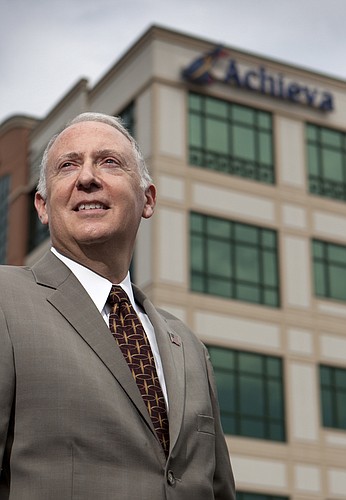A few Achieva Credit Union board members cornered new CEO Gary Regoli in late 2008.
Fresh off an intense strategy meeting on how to slow the proliferation of loan delinquencies, the board worried Regoli might make his stint a short one. After all, Regoli had only replaced longtime Achieva CEO Wendell Brooks a few months earlier. One board member pointedly asked Regoli if he regretted leaving Wichita, Kan., where he ran another credit union for nearly a decade.
Regoli, though, stuck it out with Clearwater-based Achieva, which is closing in on $1 billion in assets and is one of the 15 largest credit unions in Florida. Says Regoli: “This credit union has a lot of untapped potential.”
That could be the slogan for a trio of large Tampa-area credit unions these days, including Achieva, which recently launched a rebranding campaign to coincide with its 75th anniversary. Tampa-based GTE Financial, which was GTE Federal Credit Union until last month, and Tampa-based Grow Financial Federal Credit Union are also rebranding and expanding.
Those moves, furthermore, mirror a national trend: The Credit Union National Association, a lobbying and trade group, says credit unions nationwide added 1.3 million new members in the first half of 2012. New and used cars loans, credit union staples, were up 3.6% in the first half of 2012, the association reports, while business loans increased 2.7%.
Grow Financial intends to grow both in Florida and, uncharacteristically for credit unions, into new states. Grow recently surpassed $1.8 billion in assets — a tally that makes it the third-largest Gulf Coast-based financial institution, ahead of all banks except USAmeriBank and Raymond James.
 Grow's first non-Sunshine State target is South Carolina, where it seeks to open a regional headquarters in Columbia, the state capital, by the end of the year. Charleston, S.C., and two Georgia cities, Savannah and Augusta, are next on Grow's list, says CEO and President Robert Fisher.
Grow's first non-Sunshine State target is South Carolina, where it seeks to open a regional headquarters in Columbia, the state capital, by the end of the year. Charleston, S.C., and two Georgia cities, Savannah and Augusta, are next on Grow's list, says CEO and President Robert Fisher.
Like Regoli in Florida, Fisher sees untapped potential in the South. South Carolina, for instance, has 75 credit unions, while there are 175 in Florida. “We have survived the downturn really well,” says Fisher. “Now it's time to leverage that and flex our muscles.”
'Conservatively aggressive'
That kind of expansion runs counter to the stereotype of credit unions being the little place around the corner, where receipts are kept in shoeboxes.
Indeed, for many years credit unions — nonprofit financial cooperatives owned by members — were restricted to certain demographics. That ranged from professions, like firefighters, military personnel or teachers, to residents of a specific county.
The ambitious expansion strategy at Grow Financial, on par with an industry-wide transformation, resembles what banks did in the early 2000s, when branch growth was commonplace. Grow, for one, just opened a branch, its 19th office, in downtown Tampa. It plans to open more locations, in Lakeland and Wesley Chapel, in the next few months.
“I always look at us as being conservatively aggressive,” says Fisher. “I think we are smart about how we do business.”
GTE's focus, however, is more on rebranding than expanding. The credit union has a new logo, with new colors, and is marketing several new technology initiatives. But the biggest change is a subtraction: GTE dropped credit union from its name.
GTE President and CEO Joe Brancucci, in an online letter to members last month, wrote that the credit union would remain a credit union, even without the designation in its name. He adds that GTE, with $1.5 billion in assets, has no plans to merge with another credit union. The name change, instead, reflects its desire for a broadened image.
The changes at Grow Financial, GTE and Achieva might have the credit union industry abuzz, but it irks many bankers. The main banker-led complaint is credit unions don't pay taxes under nonprofit status. Bankers say even though the credit union mission is noble, the tax-exemption, especially for some larger credit unions, is an unfair competitive advantage. Those larger credit unions, bankers allege, do mostly everything a bank does, from business loans to mortgages.
Florida Bankers Association President Alex Sanchez has fought the exemption in state and federal settings. “It's shameful these behemoth mega billion-dollar credit unions are strutting their stuff and not paying any state or federal taxes,” Sanchez says. “We have to address this problem.”
Achieve success
Achieva, meanwhile, hired Regoli away from his previous credit union in 2008 to address two clear missions: Grow into new markets, and surpass $1 billion in assets.
The 250-employee credit union is tantalizingly close to the latter goal, with $997.1 million in assets through June. The move into new markets is likewise a constant work in progress. For example, Achieva will open its first branch in Hillsborough County in the next few months, in the Westchase area. Hillsborough County, says Regoli, is “a huge market for us.”
Another market Regoli says has large potential is the southern tip of the Gulf Coast, in Lee and Collier counties. That's why Achieva plans to open two branches inside Publix stores in Cape Coral early next year. “Banking is an errand,” says Regoli. “You just have to be where people shop.”
More Achieva growth has come through acquisitions, including the 2009 merger with Sarasota Coastal Credit Union. Sarasota Coastal was one of the fastest-growing credit unions in Florida in the late 1990s. But, at $235 million in assets in 2008, it began to struggle under the weight of significant loan loss issues. The Achieva-Sarasota Coastal merger created an $800 million asset institution with 90,000 members in six Gulf Coast counties.
Another expansion area at Achieva is in business loans, mostly to entrepreneurs who seek $1 million or less in financing — loans normally too low for community banks. “We are doing well” in making loans to businesses, says Regoli, “but we could do more.”
Achieva had $26.2 million in business loans on its books through June, according to the National Credit Union Administration, the industry's federal regulator. That's up from $16.5 million in business loans in all of 2011, and $15 million in 2010, NCUA data show.
Achieva's mortgage unit has grown, too. That department, says Regoli, surpassed $10 million in total monthly loan originations in August, an all-time Achieva monthly record.
The credit union's growth was the impetus for the new rebranding campaign, which includes billboard, radio, TV and Internet ads. Says Regoli: “Our visual image was a little tired and weak.”
Compliance concerns
Even though growth has come relatively fast since the depths of the recession, Achieva and other credit unions face a host of challenges. Pressure from bankers, who lobby to curtail the industry's tax-exempt status, is one constant issue.
But the biggest challenge many credit union executives face, much like their banking brethren, is regulation. The NCUA oversees credit unions, but in the Sunshine State so too does the Florida Office of Financial Regulation. The Dodd-Frank financial reform bill adds a layer of rules, and the Consumer Financial Protection Bureau is another control mechanism.
“We are getting buried by regulations,” says Regoli. “There is a price to regulation, and consumers often end up paying for it.”
Achieva recently hired a risk-management official, and it also works with a Bank Secrecy Act specialist and a fraud specialist. The credit union outsources other regulatory compliance tasks.
Grow Financial's Fisher shares the over-regulated concerns. “The sheer amount of regulations coming down from Washington, D.C., is mind-blowing,” says Fisher. “It takes manpower and investment in time to comply with these regulations.”
Future Leaders
When Achieva Credit Union President and CEO Gary Regoli seeks to pump up his 250 employees, he chats about hotels and shoes.
That's because Regoli wants Clearwater-based Achieva to emulate companies like the Ritz-Carlton and Zappos, the popular online shoe store. Those companies, says Regoli, excel at customer experience and service.
To that end Regoli recently directed Achieva's human resources department to create an internal leadership institute. He would like the next wave of employees to carry on the customer-first philosophy, both for the benefit of Achieva, and the credit union industry. Says Regoli: “We want to be the one from credit union-land that creates leaders.”



 Grow's first non-Sunshine State target is South Carolina, where it seeks to open a regional headquarters in Columbia, the state capital, by the end of the year. Charleston, S.C., and two Georgia cities, Savannah and Augusta, are next on Grow's list, says CEO and President Robert Fisher.
Grow's first non-Sunshine State target is South Carolina, where it seeks to open a regional headquarters in Columbia, the state capital, by the end of the year. Charleston, S.C., and two Georgia cities, Savannah and Augusta, are next on Grow's list, says CEO and President Robert Fisher.




